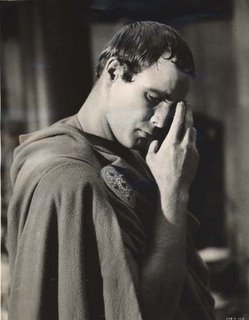
Just about the most irritating film version of Julius Caesar (out of a pretty poor bunch) is the one (ill)staring Marlon Brando.
The deadly thing is his accent - his "British" accent. Sensibly, most of the Americans in the film keep their accents over the other side of the Atlantic leaving the genuine Brits to this side.
Not Brando - the method gets hold, the real Antony is to be found in a British Accent, so a British Accent he has to have!
It is a faultless British Accent too - not a sound out of place - as rigidly coiffured as Brando's greasy black hair.
And as false and dead.
It is too real - too correct - faultless and, so, faulty.
Real living Brits don't sound like that - the idiosyncrasies and foibles of the individual are missing. It tries so hard to be British it ends up an unintentional caricature. Not 'Allo Allo' caricature - that's funny because it is intentional - and is as much the English laughing at their own inability with languages as anything else. More a bad Elvis impersonator caricature – the costume white and sparkling, the gyrations all there, the exact copy of the voice – all lifeless.
I get the same feeling about 'Woman in White'. I'm up to the end of the lawyer's narrative.
It's very worthy, very realistic - checked for factual accuracy by a genuine lawyer - and as dead as the proverbial extinct bird.
Take Sir Percival Glyde, for example. We’re given lots of little details intended to bring a roundness and verisimilitude to the character – his balding head, his worn face, his tender, affectionate behaviour with Laura, his directness over the business of the letter – every sort of detail you would wish!
What’s the mantra of junior school teachers about character?
“You know a character by what he says, what others say about him, how he dresses, what he does and what he doesn’t do.”
It’s all there for Glyde. Nothing, so far, though really brings his character life. It’s just too correct.
And what is his character? The bad-man; the impostor: The beautiful, attractive gentleman everyone is in love with – he’s an Elf from ‘Lords and Ladies’!
In that book you don’t have to ask the question why people fall for the ‘Fair Ones’ – it is magic, they just do – and it takes a coven of exceptional “old prunes” to see through to the reality behind the mask. All the other characters fall for the attraction.
In Woman in White, the problem seems to be that in attempting to be realistic you have to give realistic reasons for people’s belief and faith in the ‘Attractive One’. No magic allowed (unlike in ‘Gothic’).
But Collins has spent a lot of his energies making sure none of his characters is actually attracted to Glyde. They all see through him – even the couldn’t-care-less uncle is aware of a problem.
And he doesn’t give the reader anything to say I understand why people fall for this man’s charms.
He’s wearing a black cowboy hat for goodness sake!





No comments:
Post a Comment